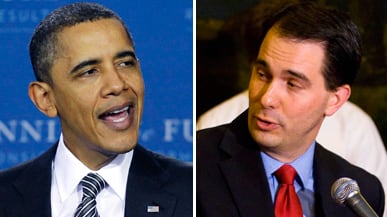The right won that state’s budget fight, reigning in unions’ collective bargaining clout. Peter Beinart on how that victory ensures a Democratic victory in 2012.
We’re still roughly a year away, but it’s already possible to predict the central dynamic of the 2012 presidential race: The more conservatives win, the more Republicans will lose.
The latest evidence is Wisconsin. For conservatives, who yearn to walk in the footsteps of Reagan and Thatcher, last week’s vote was thrilling; the equivalent of the air traffic controllers and mine workers’ fights of the 1980s. They’re right to be thrilled. Even if public sector unionism limps on, in policy terms, the right has already won. The mainstream debate is no longer about whether public employees should keep their benefits. It is about whether governors should cut those benefits via negotiation or firing squad.

And that’s only one aspect of the broader, head-snapping shift that has taken place over the last six months. For much of 2009 and 2010, Democrats in Washington wanted to stimulate our way out of recession, primarily with government spending. Republicans in Washington wanted a smaller stimulus, more geared towards tax cuts. Today, by contrast, Washington Republicans want to take a meat cleaver to the federal government while Washington Democrats merely want a stiletto. Even Medicare and Medicaid are no longer sacrosanct. It’s an amazing ideological turn. Two years ago, many people—myself included—believed that Obama spelled the end of the Reagan-Gingrich-Bush era. Democrats would set the terms of debate in a way they hadn’t since the 1960s, and Republicans would be forced, kicking and screaming, to adapt. It hasn’t turned out that way. Yes, Obama achieved big legislative victories of the kind Jimmy Carter and Bill Clinton never could, but the lingering recession and metastasizing deficit have kept him from creating a new ideological reality. To the contrary, today’s economic policy debate—which is the only debate that really matters in American politics right now—has become essentially a contest between conservatives and conservatives lite.
But it’s for precisely that reason that Barack Obama will likely win a second term. When Democrats controlled both houses of Congress, and Obama was pursuing his version of the Great Society, Republicans had a fighting chance of portraying him as a radical, frightening figure. Now that opportunity is gone. Instead, he looks like the bulwark against conservative radicalism. In 2010, Republicans successfully accused Obama of abetting the extremism of Nancy Pelosi. In 2012, Obama will ask Americans if they want a president who abets the extremism of Scott Walker. By so successfully shifting the ideological debate to the right, Republicans have reframed Obama as a man of the center. And by terrifying liberals, they are helping ensure that Obama gets the large Democratic base turnout he needs.
When Obama was pursuing his version of the Great Society, Republicans had a fighting chance of portraying him as a radical, frightening figure. Now he looks like the bulwark against conservative radicalism.
• Michael Moore: America Is Not Broke 2012 is looking more and more like 1996. That year, Bill Clinton ran as the me-too candidate, the candidate who also wanted to cut government spending, but didn’t want to destroy Medicare and Medicaid in the process. He ran as the candidate who also wanted to slash welfare payments, but didn’t want to end food stamps. And he ran as the candidate who would restrain Newt Gingrich, all the while draping Gingrich around Dole’s neck. Dole was stuck. He couldn’t embrace Gingrich, whose views horrified swing voters. But he couldn’t reject Gingrich either, or else forfeit his chance of turning out conservatives on Election Day.
The 2012 Republican nominee will likely face the same problem. Embracing Scott Walker will alienate independents; rejecting him will alienate the conservative base. Parties usually win elections when their partisans are pragmatic enough to nominate candidates with crossover appeal but desperate enough to turn out for them nonetheless. Today’s GOP isn’t that kind of party. The Democrats, especially after last November, are.
But don’t feel too bad for conservatives. For the time being, at least, they have tamed another Democratic president. And as smart conservatives understand, controlling the White House isn’t the greatest prize in American politics. Controlling the terms of debate is.
Peter Beinart, senior political writer for The Daily Beast, is associate professor of journalism and political science at City University of New York and a senior fellow at the New America Foundation. His latest book, The Icarus Syndrome: A History of American Hubris, is available from HarperCollins. Follow him on Twitter and Facebook.






